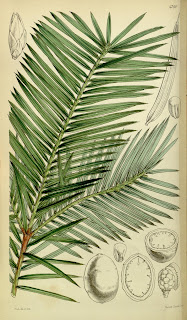Type specimens of many California endemics described in the 1850s are often uncertain. in the instance of Torreya californica, the NY holotype Barcode 1212 is not attributed to either a collector, date or place!
In the protologue “Notice of the California Nutmeg” (New York J. Pharmacy Vol. 3 3: 49. 1854}) Torrey writes “About a year ago, I received from the late Mr. Shelton, a specimen of what was called California Nutmeg”. Who was Shelton? C.C. Shelton does not appear in the Harvard Index of Botanists.
Fortunately that question was explored by Ewan (1981), wherein Shelton is placed in California before 1853 engaged in collecting plants and in various agriculture endeavors. Shelton died accidentally on the steam explosion of the paddlewheel “Jenny Lind” enroute to Sacramento on April 11, 1853.
NY has 12 specimens collected by Shelton, only one with a specific date (1852). All of these, save for one (Penstemon centranthifolius) are consistent with originating in the Sierra. Torreya californica has a discontinuous distribution in California: along the length of the Sierra at mid elevations (~1500-4500 feet) and in the Coast Ranges. Torrey attributes the origin of his specimen to "upper part of the Yuba and Feather Rivers on the western slope of the Sierra Nevada..."
Torreya
californica was apparently first collected by Wm. Lobb in 1851, which was then
described by Hooker as Torreya myristica Hook., Botanical Magazine 80: pl.
4780. 1854 (the color plate above). Were it not for the fact
that Hookers name is 57 days older than Torrey’s we would be grumbling when
using that name for endemic Torreya.
Reference: Ewan, Joseph. "WHO WAS JOHN TORREY'S"
PROF." SHELTON LOST ON THE STEAMBOAT JENNY LIND?." Occasional Papers of the
Farlow Herbarium of Cryptogamic Botany (1981): 59-65




1 comment:
Very informative! It's amazing how far back some of our most beloved plants were discovered!
Post a Comment